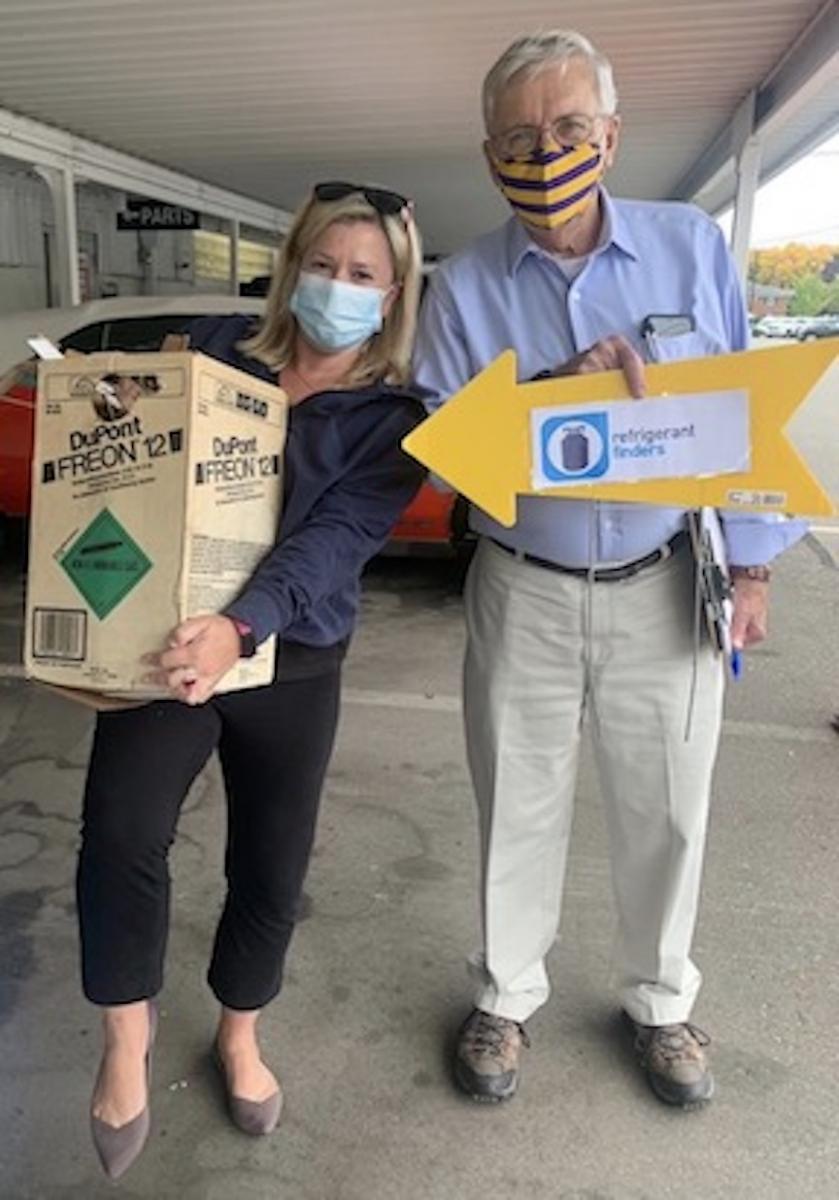Save the planet from your driveway!

Save the planet from your driveway!
Keywords: Climate Solutions, Carbon-neutrality
Description
Liz Vogel was one of the first Rotarians to volunteer as an ESRAG Feral Freon hunter, drawn by the prize: proving that Rotary volunteers could help permanently eliminate 10,000 pounds of incredibly potent greenhouse gases in three months.
Now, three months in, the young President-elect and fellow members of Grosse Pointe Rotary Club in Michigan, USA have bagged one 35-pound cylinder and three small cans. And they are hooked: the prize is elusive, but its value is immense.
“I’ve had to change my mindset. I love that graphic which shows that if the Freon in one 30-pound tank escaped, it would have the global warming impact of burning all the gasoline in two tank trucks,” she exclaims.
“645 pounds or 2,775 of CO2 equivalent has been removed!” wrote Clari Nolet, director of ESRAG’s carbon offset projects, on Dec. 2. That’s in just nine cities. “We’re extending the pilot through March 31, 2021 to get all the cities covered,” Nolet adds. You can see the city list and learn how to get involved here. “Tradewater is very pleased and knows this takes time. We are looking for sites to be ongoing, too.”
The project is to collect stockpiles of Freon and other refrigerants which have been banned from production since the early 1990’s by the Montreal Protocol. The international agreement unfortunately included no mandate on how to eliminate existing supplies. But with a rapidly-expanding market for carbon offset, the Chicago-based social enterprise Tradewater is now finding sellers. Tradewater buys cylinders and cans of specific refrigerants, and has them shipped them to a licensed facility that permanently destroys them. Tradewater then sells the resulting high-quality carbon offset credits to companies committed to progressing towards carbon-neutral operation.
The role of Rotary teams is to schedule a kind of reverse yard sale to accept the refrigerant, hand over payments provided by Tradewater, and store the containers a few days till they can be picked up by FedEx. If the pilot project succeeds, this will open the potential for an agreement between Tradewater and ESRAG to share some of the revenue with ESRAG to be used for Rotary environmental grants.
One reason for the slower-than-expected pace is that sellers don’t always show up on the scheduled day. Clari Nolet is exploring alternate strategies, like scheduling regular quarterly collection days in each city to build up volume. Another hurdle is that it’s been hard to persuade Rotary clubs to agree to handle cylinders that look as if they hold something scary. Freon is non-flammable, non-explosive, and non-toxic to humans.
“It’s safer than the propane you use in a grill, so I feel perfectly comfortable putting Freon in my garage until it can be shipped by Tradewater,” says Liz Vogel. Readers! Take note! This is not risky!
“I have to admit it’s frustrating when you plan an event for five sellers, and two show up,” says Liz Vogel. “But cancellation is just normal. You have to change your mindset. When our Club collected their first cylinder, we were really excited. That’s a greenhouse gas which is now off the shelf where it could have leaked. If it leaks in Michigan, that’s a problem for the whole world.”
The project has proved especially welcome in the COVID crisis. “Rotarians are People of Action,” PE Liz points out. “This whole pandemic has stifled our ability to get out and do community service. A lot of clubs do big international projects that are on hold right now. This is an international project you can do at home.”
“Assuring that feral Freon CHCs cannot be emitted into the atmosphere is one of the clearest contributions we can make to keeping climate change in check,” says Ed Church, Rotary Club of Berkeley, California, USA. “Most of our Rotary hands-on projects await the ending of COVID restrictions, so collecting and shipping these refrigerants is a powerful way for our Club to make a difference.”
Liz Vogel suggests that you approach this project like a fisherman. “Just because you don’t catch anything one day doesn’t mean you stop fishing. Besides, even if no seller shows up, you’ve just gotten to hang out with a fellow Rotarian you wouldn’t ordinarily see from 5 to 6 on a Tuesday. That’s fellowship!”
The list of cities where Tradewater would like Rotarians to pitch in is on the Feral Freon page in ESRAG’s website. If yours is on the list – and even if it isn’t – email Clari Nolet if you’re intrigued. We need just 2-4 volunteers from your club, plus a bathroom scale, a folding table, and the use of a parking lot or driveway for a couple hours for each collection event. This winter, switch into garage sale mode, recruit a couple of friends, and help us save the planet!